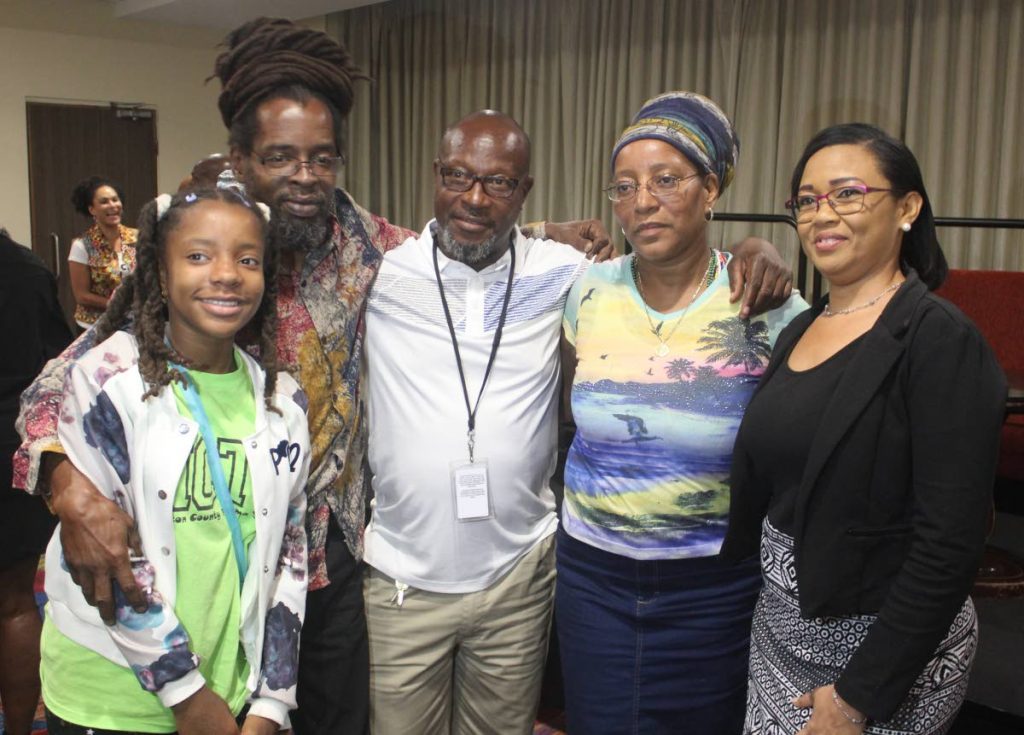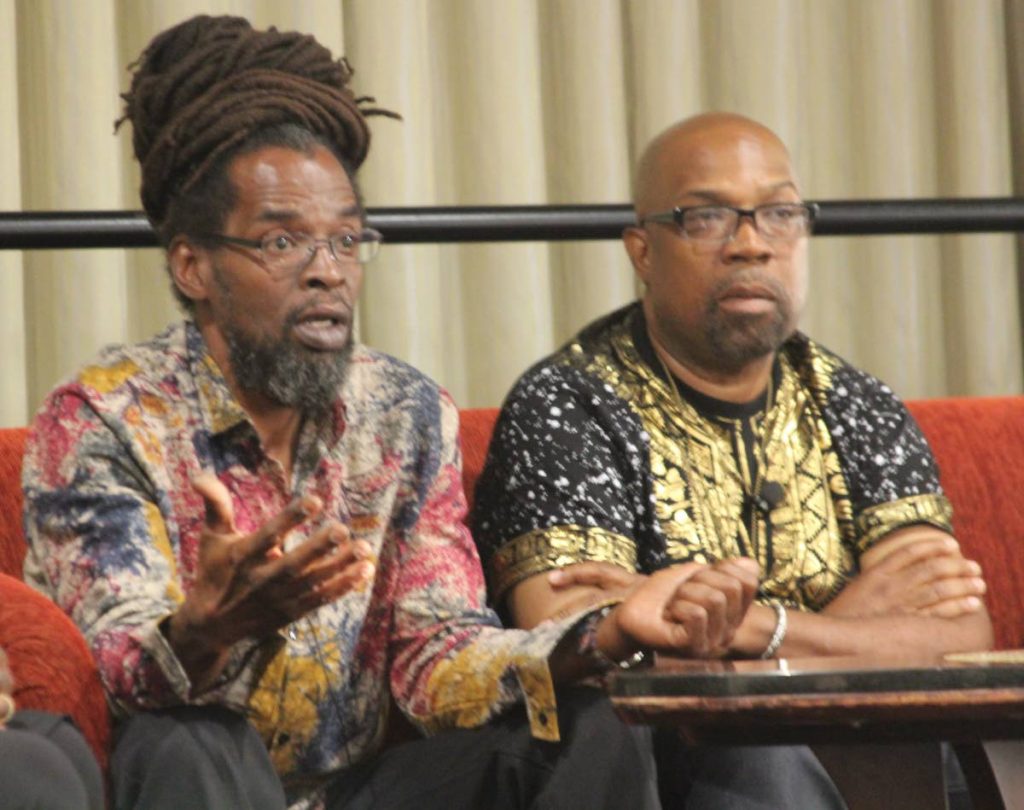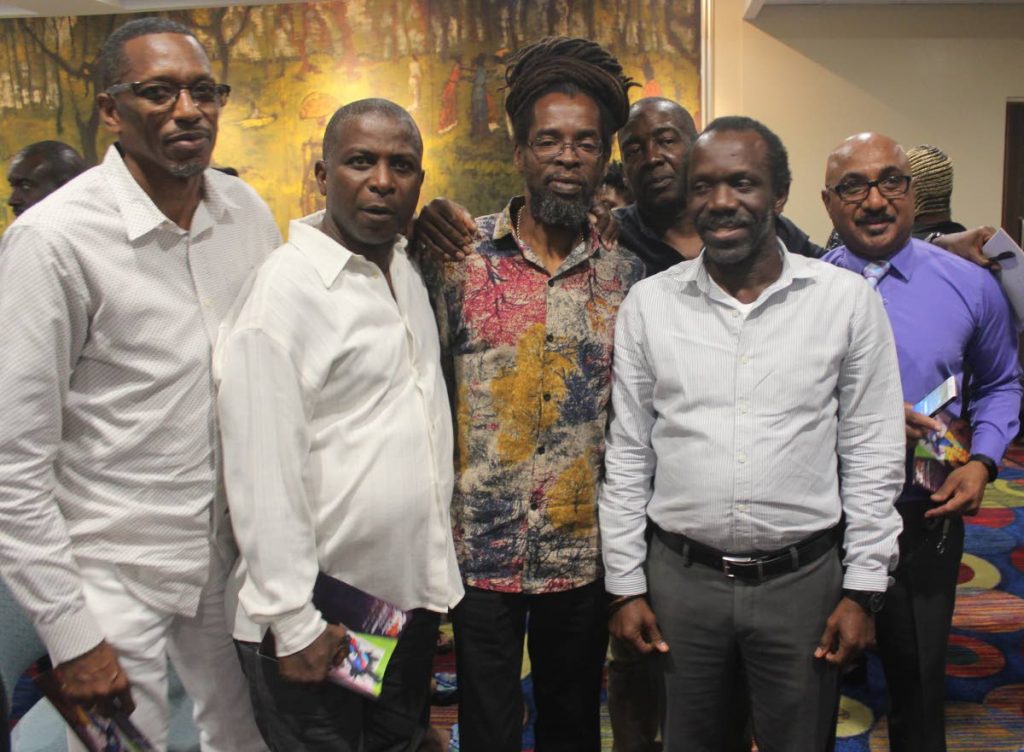A Fight For Justice

Colin Warner’s 21-year incarceration in the US for a crime he did not commit, mirrored aspects of Nelson Mandela’s own lengthy imprisonment in South Africa, more than four decades ago.
Like Mandela, Warner lost most of his productive years to an unjust legal system but proclaimed his innocence throughout his jail term.
Warner, like the late anti-apartheid icon, has also become an ambassador for people experiencing undue persecution all over the world.
However, unlike Mandela, who seemed emotionally unscathed after 27 years of imprisonment, Warner’s road to forgiveness remains a work in progress.
“I eh forgiving nobody,” Warner, 56, declared on Wednesday during a forum hosted by Africa Film Trinidad and Tobago (AFTT) at the Hilton Trinidad, St Ann’s, to promote the movie, Crown Heights: A Fight For Justice, which highlights his wrongful conviction for murder in New York in the early 1980s.

Criminologist Renee Cummings hosted the event.
The movie, which won an award last year at the Sundance Film Festival, premiers today at IMAX, Woodbrook, at the close of the AFTT.
“There is no forgiveness but I realise what I have to do and its up to me to do it,” he continued, in response to a question about his state of mind after his February 2001 release from prison.
“I get a lil break to have a lil bit more control of my life, not total. But enough that we could make decisions that could be better for us.
“We eh kids no more. We can’t think like kids. That gone, we have to be adults and make decisions that can help us, our families and our communities.”
Wednesday’s forum attracted several of Warner’s classmates, ex-prison inmates and criminal justice practitioners.
The dreadlocked Warner, whose voice quivered with emotion several times during the forum, has come to terms with aspects of his imprisonment. He said holding on to the ordeal would only lead to his detriment.
“The people who bring anger and bitterness, I believe they don’t want me to move forward because if I was so angry and bitter, none of this here (forum) would be happening.”

Produced by Natalie Galazka, Matt Ruskin and Nnamdi Asomugha, Crown Heights: A Fight for Justice, gives a chilling, detailed account of the circumstances which led to Warner’s wrongful conviction and incarceration for the 1980 murder of a teenager in Flatbush, Brooklyn.
But it is also a heart-warming story of unconditional love, friendship and camaraderie as Warner’s devoted wife, Antoinette, and boyhood friend, Carl King, both fought zealously to clear his name.
Visibly grateful for King’s unwavering support, Warner hailed King as an “incredible human.”
“When I say incredible, he comes from some planet or discovered some secret formula for longevity. But he is incredible as a human. I did 21 years in prison physically but I could tell you, mentally, this man take the cake.
“I ain’t ask him. He did it because he felt something was wrong....So this is the angel in my house. This is my brethren and you better like him,” he told guests, who erupted into laughter.
For King, who had no legal or law enforcement background at time of Warner’s arrest, helping his friend was a must.
“It was unbelievable,” he said of Warner’s arrest and subsequent conviction.
“We all hung together. We started growing locks together at a young age.”
King said Warner could not have committed the crime. “At the time I heard the news that Colin was arrested, two other of my friends were with him at that particular time when he was supposed to be committing the crime.
“So, they were actually his alibi and were supposed to be his co-defendants if they actually came forward and tell the police they were actually with him when the crime was supposed to be committed.”
Additionally, King said at the time they also were not venturing into the Flatbush area because they lived in Crown Heights.
“So, it was alarming and traumatic to me and I thought it was a mistake that would have been cleared up in a few days. But in a few days he was actually indicted.
King said Warner gave him the encouragement to fight, “And I was not about to let my friend go down.”
THE MURDER
Warner was wrongfully convicted of shooting Jamaican teenager Mario Hamilton in the back of the neck, outside of Erasmus Hall High School, Brooklyn, New York, on April 10, 1980.
Two youths, Thomas Charlemagne, 14, and Hamilton’s brother, Martell, 15, claimed Warner had shot the teenager after stepping out of the car driven by Norman Simmonds, who was also 15.
The following day, police interviewed Martell and showed him a line-up of suspects but he did not identify anyone.
However, Martell told detectives that two days before the shooting, Simmonds had threatened to kill his brother.
Police later showed Martell a photograph of Warner, who claimed he may have seen him at the scene of the crime.
Warner was arrested that afternoon and indicted on May, 12, 1980 on charges of second-degree murder and second-degree criminal possession of a weapon. Simmonds was arrested in October 1980 and charged with murder.
Warner and Simmonds went on trial in March 1982 but the trial had been delayed because Charlemagne had disappeared.
Charlemagne subsequently testified that Mario was killed by Simmonds in a drive-by shooting, which contradicted his earlier claim that Warner was the gunman who walked up and killed the teenager.
The trial ended in a hung jury and a mistrial was declared.
Warner and Simmonds were tried again in May 1982 and convicted. Simmonds, a juvenile at the time of the murder, received nine years to life, while Warner was sentenced to 15 years to life.
Warner, who had migrated in 1978 from Bellevue/Dibe area, Trinidad, to be with his biological mother in New York, was just 18 at the time he was accused of shooting the teenager.
Simmonds was paroled in 1989. Warner was released in 2001.
VINDICATION
Two years before, though, King had brought Warner’s case to the attention of attorney William Robedee, who noted Charlemange’s about-turn in his account and the paucity of physical evidence linking Warner to the murder.
King said he had found witnesses never called by the defence who said Warner was not at the scene of the crime.
Mario Hamilton’s brother, Martell, later provided an affidavit saying that he only fingered Warner because he was pressured by police.
Simmonds was subsequently recalled and under oath, admitted he killed Hamilton. Robedee also presented two witnesses, friends of Simmonds, who said they saw the shooting and that Simmonds acted alone.
The Kings County District Attorney’s Office, New York, carried out a reinvestigation, including polygraph tests of witnesses and agreed not to withhold Warner’s release.
Robedee’s motion to vacate the conviction was granted on January 31, 2001 and one month later, Warner was released.
In 2002, Warner filed a claim for wrongful incarceration with the New York Court of Claims and settled for $2 million.
Today, 17 years after his release, Warner is still questioning his role and mission as a free man but has vowed to soldier on.
“One of the purpose is to reach out and help people because without any help for me I would not have been here talking to you now,” he told the audience.
“We all need help. Ain’t nobody who would deny help because we can’t do it 100 per cent every day of the year.”
Warner leads a relatively comfortable life with his wife and young daughter, Nehanda, but feels the need to do more.
“I have a house in New York where the city pays people to live in. I have other houses that I rent, but I know I need to go further and I am willing and will try to keep myself open for any opportunities that I see I can utilise, gain from and also help another human being.”
He urged the audience to do also their part in helping others.

Comments
"A Fight For Justice"